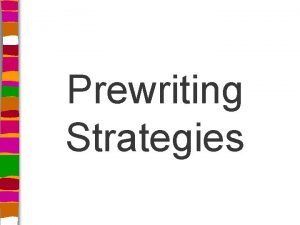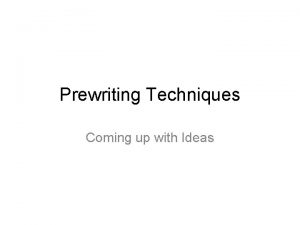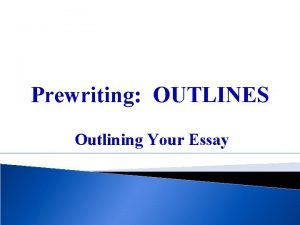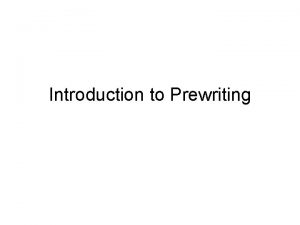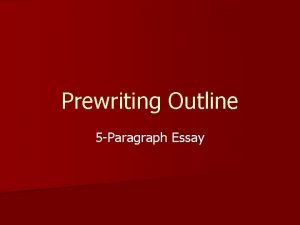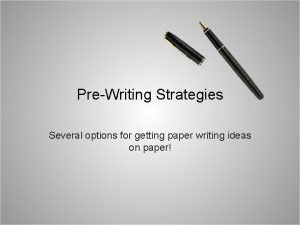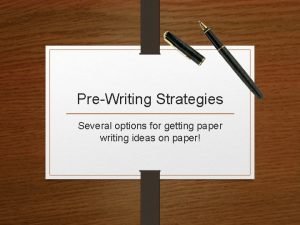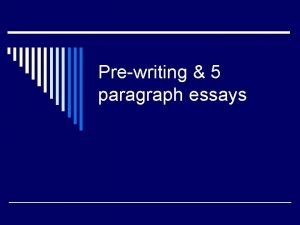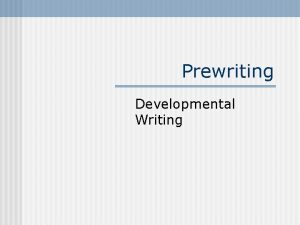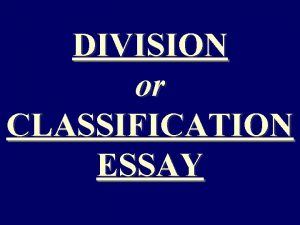PreWriting Strategies Several options for getting paper writing










- Slides: 10

Pre-Writing Strategies Several options for getting paper writing ideas on paper!

Reading & Audience • Instructing students on how to approach a reading assignment for which they will write a paper will help the pre-writing process. • Always consider Audience

Six Pre-Writing Strategies • • • Freewriting Visualizing Listing Outlining Clustering/Webbing Cubing

Freewriting • • • Freewriting simply means putting your pen to the paper and writing whatever comes into your head about an assigned writing topic. Time yourself for at least five minutes. Read the topic, think about some ideas and then begin writing. Don't worry about grammar or punctuation -- the purpose of free- writing is to get ideas written out without worrying about other issues. The key is to keep writing, even when you are having difficulty thinking of something to say.

Visualization • After you have decided on the experience you will write about, close your eyes, and try to remember the sensory details of the experience: Sight: What did you see during this experience? did the people and environment look like? What things were in the room? People? What did they look like? Sound: What sounds did you hear? Traffic sounds? birds? music? What were people saying? Was it silent or noisy? Smell: What smells did you smell? Smoke? Cooking smells/ Perfume? Crayons? Sweat? Taste: What did your mouth taste like? Mint gum? dry with fear? Touch: What did you feel? Stomach ache? Head ache? Cold or hot? • After you are done imagining all of the senses involved (this should take from 10 -15 minutes) open your eyes, and do some listing or free-writing about the details you remember.

Listing • Generate a list of all the things you think of related to your topic. • You can think of your list as a sort of grocery list of the items that make up your topic.

Outlining • Outlining is a good way to organize your ideas. It's best to use an outline after you've done some freewriting, listing or clustering. It's also good to use an outline after you've written the first draft to help you organize your paragraphs and sentences. EXAMPLE: • Intro and Thesis: Although it encourages moral behavior, "The Smurfs" reinforces stereotypical gender roles. Body of paper: Background, basic description of the show Moral behavior – the smurfs model prosocial friendship behavior Moral behavior – importance of communitytransition: BUT PROBLEMS WITH GENDER Description of feminine characteristics – Smurfette as a stereotype Smurfette restricted to home-based, nurturing role in the show Masculine characteristics in other Smurfs Male Smurfs go on adventures How smurfs reflect gender stereotypes in commercials and society Consequences: Possible messages this show sends to kids

Clustering/Webbing • • • Clustering is another way to record your thoughts and observations for writing a paragraph or essay 1. First, in a circle near the center of the page, write out the subject of your essay or paragraph. 2. Then write down other ideas that relate to your central ideas -- use lines and circles to "map" how the different aspects of your topic will relate to each other.

Cubing • CUBING is a way of getting six different perspectives (like the six sides of a cube) on your topic and generating some complex claims and evidence for your paper. • 1 Description/Definition: Write 4 -5 sentences describing your topic. Define the culture and the time period and the age on which you want to focus. Define and describe characteristics of your topic. 2 Association: What memories, thoughts, examples, experiences do you have with this specific topic? Write 4 -5 sentences that focus on a vivid memory or example. Use sensory details and dialogue. GET CONCRETE! 3 Comparison: How is (your focus topic) different from or similar to _____? Compare your focus topic to something else. Write 4 -5 sentences comparing your topic to something related to it. • • • 4 Analysis: Why is it this way? Give some reasons or possible causes for the issue you are discussing. Give some supporting details, evidence. Are there any controversial debates associated with your topic? What issues are people concerned with? Write 4 -5 sentences answering these questions. • 5 Application: What are the results or consequences of this situation? How does this affect individual people and the society they live in? Write 4 -5 sentences. • 6 Argumentation: What is your opinion about this situation? Do you have any social criticism or recommendations for what should be done? How should things change? Or not change? Write 4 -5 sentences.

Website Info • http: //flightline. highline. edu/writing 99/assignments/prewriting_strategies. htm
